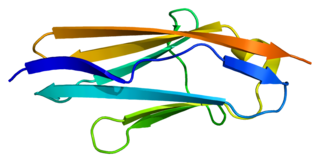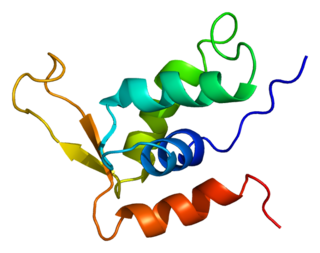
Bifunctional purine biosynthesis protein PURH is a protein that in humans is encoded by the ATIC gene.

Melanophilin is a carrier protein which in humans is encoded by the MLPH gene. Several alternatively spliced transcript variants of this gene have been described, but the full-length nature of some of these variants has not been determined.

GATA2 or GATA-binding factor 2 is a transcription factor, i.e. a nuclear protein which regulates the expression of genes. It regulates many genes that are critical for the embryonic development, self-renewal, maintenance, and functionality of blood-forming, lymphatic system-forming, and other tissue-forming stem cells. GATA2 is encoded by the GATA2 gene, a gene which often suffers germline and somatic mutations which lead to a wide range of familial and sporadic diseases, respectively. The gene and its product are targets for the treatment of these diseases.

Pur-alpha is a protein that in humans is encoded by the PURA gene located at chromosome 5, band q31.

Core-binding factor subunit beta is a protein that in humans is encoded by the CBFB gene.

60S ribosomal protein L6 is a protein that in humans is encoded by the RPL6 gene.

Homeobox protein Hox-B3 is a protein that in humans is encoded by the HOXB3 gene.

Myosin-2 is a protein that in humans is encoded by the MYH2 gene.

ETS domain-containing protein Elk-3 is a protein that in humans is encoded by the ELK3 gene.

Cytoskeleton-associated protein 2 is a protein that in humans is encoded by the CKAP2 gene.

Unconventional myosin-Ia is a protein that in humans is encoded by the MYO1A gene.

Myosin-XVIIIa is a protein that in humans is encoded by the MYO18A gene.

Striated muscle preferentially expressed protein kinase, in the human is encoded by the SPEG gene, a member of the myosin light chain kinase protein family. SPEG is involved in the development of the muscle cell cytoskeleton, and the expression of this gene has important roles in the development of skeletal muscles, and their maintenance and function. Mutations are associated with centronuclear myopathies a group of congenital disorders where the cell nuclei are abnormally centrally placed.

Copine-8 is a protein that in humans is encoded by the CPNE8 gene.

Single-stranded DNA-binding protein 2 is a protein that in humans is encoded by the SSBP2 gene.

Forkhead box protein K2 is a protein that in humans is encoded by the FOXK2 gene.

Myosin light polypeptide 6 is a protein that in humans is encoded by the MYL6 gene.

Cysteine and glycine-rich protein 2 is a protein that in humans is encoded by the CSRP2 gene.

Zinc finger protein 346 is a protein that in humans is encoded by the ZNF346 gene.

Myeloid leukemia factor 1 is a protein that in humans is encoded by the MLF1 gene.
















